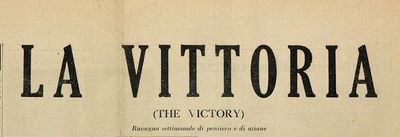La Vittoria
- Creator
- Matteo Brera, Researcher
- Media Type
- Publication
- Text
- Newspaper
- Description
Published: 926 Avenue Rd., Toronto
By the time La Vittoria appeared in Toronto on 18 April 1942, the Fifth Column hysteria in Canada had largely abated. The internal and international situations too had changed radically. However, internal political division among Italian Canadians – not only between fascists and antifascists, but also between different nuances of antifascism – remained as acrimonious and as tense as they were at the beginning of the war. The state of confusion, mistrust and apprehension in which the community found itself on 10 June 1940, still lingered in the minds and hearts of many disenchanted Italians. In order to bridge differences in the antifascist camp and counter a dangerously idle political situation La Vittoria was born, urging every Italian Canadian to fight and ‘help’ their new country win the war.
Published weekly in Toronto from April 1942 to December 1943, La Vittoria was founded by the Protestant Minister Augusto Bersani who was to serve as the paper’s editor in chief for nineteen issues. From issue 20 onward, Enio Gnudi, the communist mastermind behind the bi-weekly Il lavoratore, took over the editorial role. Between issues 19 and 20, during a six-week gap spanning from August 22 to October 10, the periodical not only changed editorship and address but also its editorial policy. Initially, Gnudi had three associate editors, Augusto Bersani, Girolamo Malisani, and Anselmo Bortolotti. By the end of 1942, Bortolotti left, followed by Bersani by the middle of 1943, leaving La Vittoria in the hands of fervent communists Gnudi and Malisani.
The reasons behind Bersani’s abandonment of an editorial project he had so strongly desired and brought to completion are unclear as is most part of his life. However, we know that in 1942 the paper suffered a severe financial crisis as many subscribers stopped paying their dues amid growing hostility from large sections of the community toward Bersani who engaged in some rather shady activities.
Bersani’s editorship occupied a middle-of-the-road political position, criticizing both the fascists and the ‘left wing extremists’, and had started on an aggressive note as he campaigned in favour of the referendum on national conscription of April 27, 1940. With this plebiscite the Federal government asked to be relieved from its previous commitment not to send conscripts to serve overseas. Voting ‘Yes’, many editorials published in La Vittoria, sided with ‘the victory of the United Nations, the triumph of justice, and the freedom of oppressed nations.’
To be in support of the referendum – Bersani argued – did not mean that Italian Canadians should abandon Italy to her tragic destiny; on the contrary, helping Canada win the war meant aiding Italy to rid itself of fascist tyranny. In Bersani’s intentions, La Vittoria was to be the banner under which all Italians who loved both countries, Canada and Italy, should unite. Unfortunately, Bersani did not command the prestige and respect necessary for such a task to succeed under his guidance. As a Protestant Minister, he had the Italian Catholic clergy to contend with and the membership of the organizations under their influence. Moreover, since Bersani was known to be involved with the RCMP, there was a deep-rooted resentment of him in the community. All this weighed negatively on La Vittoria and its initiatives.
One of these initiatives aimed at uniting the Italians so that they could be more effective in helping Canada in her struggle against fascism. To this end, La Vittoria launched an appeal for the creation of a ‘Federation of Italian Clubs and Associations’. As expected, the appeal fell on deaf ears as far as the most important Italian institutions were concerned: namely the Catholic parishes and the Order Sons of Italy which had over forty lodges in Ontario and Quebec. Only two men, pre-war fascists, answered the call for unity: Camillo Vetere, an RCMP informer like Bersani, and Dr Salvatore Mancuso of Montreal who had been interned at camp Petawawa (ON).
Augusto BersaniAugusto Bersani arrived in Montreal in the late 1920s from the United States. He was born in Italy, in the Emilia Romagna region (possibly in Bologna). It is believed that as a young man he had studied to be a priest but never completed his studies before emigrating. Once in Montreal, Bersani began to teach at the Point aux Trembles Protestant School and in 1930 he was appointed minister of the Italian Church of the Redeemer. Bersani called Father Domenico Scalera to Montreal between 1937 and 1938; the Italian clergyman, previously a schoolteacher in Tunisia and in the US, was to act as assistant pastor at the church. In those years, Bersani was implicated in financial irregularities at the church and forced to resign, although, officially, he left because of ‘health concerns’.
In 1937, while still minister at the Italian Church of the Redeemer, Bersani became involved with the RCMP as a community informant. Known as S.A. 203 (Special Agent 203), Bersani was required to provide a report on Italian Canadians involved in fascist activities. Several church members and church elders, including Rev. Scalera, were reported to the authorities and interned as a result of Bersani’s tip offs.
BibliographyTomchuk, Travis. 2012. Special Agent 203: The Motivations of Augusto Bersani , in Licia Canton et al., Beyond Barbed Wire: Essays on the Internment of Italian Canadians. Toronto: Guernica, pp. 163-177.
- Notes
- Available issues: 18 April 1942-19 June 1943.
- Place of Publication
- Toronto
- Language of Item
- English; Italian
- Geographic Coverage
-
-
Ontario, Canada
Latitude: 43.70011 Longitude: -79.4163
-
- Copyright Statement
- Copyright status unknown. Responsibility for determining the copyright status and any use rests exclusively with the user.
- Location of Original
- York University Libraries, Clara Thomas Archives & Special Collections (Toronto, Canada)
- Contact
- York University Libraries, Clara Thomas Archives & Special CollectionsEmail:mbrera@uwo.ca
Website:
Agency street/mail address:305 Scott Library, 4700 Keele Street
Toronto, ON M3J 1P3
416-736-5442


